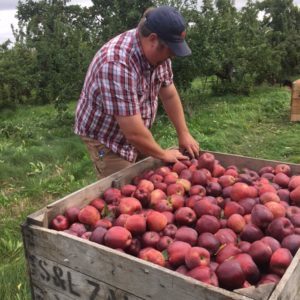Is an apple an apple? A farmer tells all.
Do farmers pour chemicals on our fruit? How do we know apples are safe? Why use any products in orchards? Are apples processed before we see them in the grocery store?
A dad to two cute little girls and husband to a cancer researcher, Michigan farmer Jeff VanderWerff is passionate about politics, the MSU Spartans and farmers doing the right thing. He took to the time to talk with me on camera, showing off his beautiful products and having a very frank discussion about why apples are grown they way they are and what is behind his family farm.
Did you know it cost apple growers thousands of dollars whenever it rains? Or that the trees can be destroyed by scab? In addition to explaining why he uses certain practices in growing apples, Jeff talked about the stringent standards and audits of fruit farmers in Food Truths from Farm to Table: 25 Ways to Shop & Eat Without Guilt (just named a #1 Amazon best-seller), He shares more about farming on Twitter and Facebook under the @AgSalesman handle.
 The top apple growing states are Washington, New York, and Michigan. Incidentally, the U.S. exports one in every four apples. Canada is a major trading partner; the U.S. exports apples north and Canada exports theirs south. The United States also imports fresh apples, mostly from the Southern Hemisphere, to keep grocery store shelves stocked from March to July. Approximately six percent of fresh apples consumed in the U.S. are imported, with the largest sources coming from Chile and New Zealand.
The top apple growing states are Washington, New York, and Michigan. Incidentally, the U.S. exports one in every four apples. Canada is a major trading partner; the U.S. exports apples north and Canada exports theirs south. The United States also imports fresh apples, mostly from the Southern Hemisphere, to keep grocery store shelves stocked from March to July. Approximately six percent of fresh apples consumed in the U.S. are imported, with the largest sources coming from Chile and New Zealand.
An apple may be an apple, but rest assured it is grown with care – and monitored more than you can imagine. The next time you grab a bag, consider farmers like Jeff and the intense system behind your apple. Enjoy and know it is safe!



